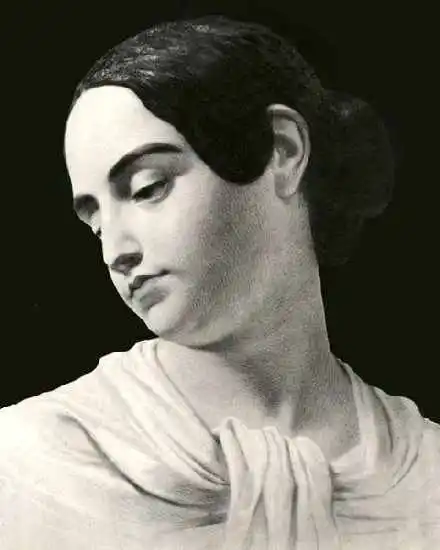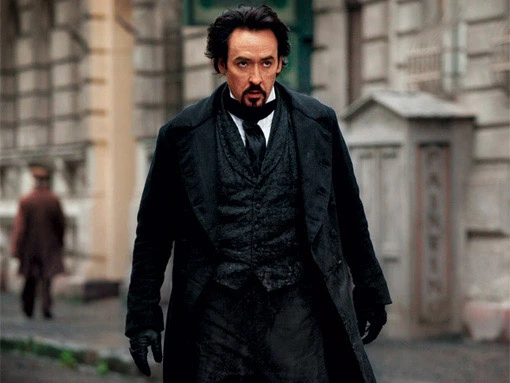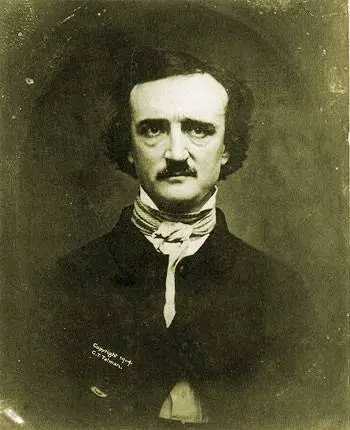] so tired, so weary,
The soft head bows, the sweet eyes close,
The faithful heart yields to repose.
DEEP IN EARTH
This is a couplet, presumably part of an unfinished poem Poe was writing in 1847.
In January of that year, Poe’s wife Virginia had died in New York of tuberculosis.
It is assumed that the poem was inspired by her death. It is difficult to discern,
however, if Poe had intended the completed poem to be published or if it was personal.
Poe scribbled the couplet onto a manuscript copy of his poem “Eulalie.” That poem
seems autobiographical, referring to his joy upon marriage. The significance of the
couplet implies that he has gone back into a state of loneliness similar to before
his marriage.
Deep in earth my love is lying
And I must weep alone.
A DREAM WITHIN A DREAM
Take this kiss upon the brow!
And, in parting from you now,
Thus much let me avow —
You are not wrong, who deem
That my days have been a dream;
Yet if hope has flown away
In a night, or in a day,
In a vision, or in none,
Is it therefore the less gone?
All that we see or seem
Is but a dream within a dream.
I stand amid the roar
Of a surf-tormented shore,
And I hold within my hand
Grains of the golden sand —
How few! yet how they creep
Through my fingers to the deep,
While I weep — while I weep!
O God! can I not grasp
Them with a tighter clasp?
O God! can I not save
One from the pitiless wave?
Is all that we see or seem
But a dream within a dream?
ELDORADO
Gaily bedight,
A gallant knight,
In sunshine and in shadow,
Had journeyed long,
Singing a song,
In search of Eldorado.
But he grew old —
This knight so bold —
And o’er his heart a shadow
Fell, as he found
No spot of ground
That looked like Eldorado.
And, as his strength
Failed him at length,
He met a pilgrim shadow —
‘Shadow,’ said he,
‘Where can it be —
This land of Eldorado?’
‘Over the Mountains
Of the Moon,
Down the Valley of the Shadow,
Ride, boldly ride,’
The shade replied, —
‘If you seek for Eldorado!’
1849.
TO MY MOTHER
Because I feel that, in the Heavens above,
The angels, whispering to one another,
Can find, among their burning terms of love,
None so devotional as that of “Mother,”
Therefore by that dear name I long have called you —
You who are more than mother unto me,
And fill my heart of hearts, where Death installed you
In setting my Virginia’s spirit free.
My mother — my own mother, who died early,
Was but the mother of myself; but you
Are mother to the one I loved so dearly,
And thus are dearer than the mother I knew
By that infinity with which my wife
Was dearer to my soul than its soul-life.
1849.
THE BELLS
I.
HEAR the sledges with the bells —
Silver bells!
What a world of merriment their melody foretells!
How they tinkle, tinkle, tinkle,
In the icy air of night!
While the stars that oversprinkle
All the heavens, seem to twinkle
With a crystalline delight;
Keeping time, time, time,
In a sort of Runic rhyme,
To the tintinnabulation that so musically wells
From the bells, bells, bells, bells,
Bells, bells, bells —
From the jingling and the tinkling of the bells.
II.
Hear the mellow wedding-bells
Golden bells!
What a world of happiness their harmony foretells!
Through the balmy air of night
How they ring out their delight! —
From the molten-golden notes,
And all in tune,
What a liquid ditty floats
To the turtle-dove that listens, while she gloats
On the moon!
Oh, from out the sounding cells,
What a gush of euphony voluminously wells!
How it swells!
How it dwells
On the Future! — how it tells
Of the rapture that impels
To the swinging and the ringing
Of the bells, bells, bells —
Of the bells, bells, bells, bells,
Bells, bells, bells —
To the rhyming and the chiming of the bells!
III.
Hear the loud alarum bells —
Brazen bells!
What tale of terror, now, their turbulency tells!
In the startled ear of night
How they scream out their affright!
Too much horrified to speak,
They can only shriek, shriek,
Out of tune,
In a clamorous appealing to the mercy of the fire,
In a mad expostulation with the deaf and frantic fire,
Leaping higher, higher, higher,
With a desperate desire,
And a resolute endeavor
Now — now to sit, or never,
By the side of the pale-faced moon.
Oh, the bells, bells, bells!
What a tale their terror tells
Of Despair!
How they clang, and clash, and roar!
What a horror they outpour
On the bosom of the palpitating air!
Yet the ear, it fully knows,
By the twanging
And the clanging,
How the danger ebbs and flows;
Yet, the ear distinctly tells,
In the jangling
And the wrangling,
How the danger sinks and swells,
By the sinking or the swelling in the anger of the bells —
Of the bells —
Of the bells, bells, bells, bells,
Bells, bells, bells —
In the clamour and the clangour of the bells!
IV.
Hear the tolling of the bells —
Iron bells!
What a world of solemn thought their monody compels!
In the silence of the night,
How we shiver with affright
At the melancholy meaning of their tone!
For every sound that floats
From the rust within their throats
Is a groan.
And the people — ah, the people —
They that dwell up in the steeple,
All alone,
And who, tolling, tolling, tolling,
In that muffled monotone,
Feel a glory in so rolling
On the human heart a stone —
They are neither man nor woman —
They are neither brute nor human —
They are Ghouls: —
And their king it is who tolls: —
And he rolls, rolls, rolls, rolls,
Rolls
A pæan from the bells!
And his merry bosom swells
With the pæan of the bells!
And he dances, and he yells;
Keeping time, time, time,
In a sort of Runic rhyme,
To the pæan of the bells —
Of the bells: —
Keeping time, time, time,
In a sort of Runic rhyme,
To the throbbing of the bells —
Of the bells, bells, bells —
To the sobbing of the bells: —
Keeping time, time, time,
As he knells, knells, knells,
In a happy Runic rhyme,
To the rolling of the bells —
Of the bells, bells, bells: —
To the tolling of the bells —
Of the bells, bells, bells, bells,
Bells, bells, bells —
To the moaning and the groaning of the bells.
1849.
TO ISADORE
This poem is of doubtful origin
I
BENEATH the vine-clad eaves,
Whose shadows fall before
Thy lowly cottage door
Under the lilac’s tremulous leaves —
Within thy snowy claspeèd hand
The purple flowers it bore..
Last eve in dreams, I saw thee stand,
Like queenly nymphs from Fairy-land —
Enchantress of the flowery wand,
Most beauteous Isadore!
II
And when I bade the dream
Upon thy spirit flee,
Thy violet eyes to me
Upturned, did overflowing seem
With the deep, untold delight
Of Love’s serenity;
Thy classic brow, like lilies white
And pale as the Imperial Night
Upon her throne, with stars bedight,
Enthralled my soul to thee!
III
Ah I ever I behold
Thy dreamy, passionate eyes,
Blue as the languid skies
Hung with the sunset’s fringe of gold;
Now strangely clear thine image grows,
And olden memories
Are startled from their long repose
Like shadows on the silent snows
When suddenly the night-wind blows
Where quiet moonlight ties.
IV
Like music heard in dreams,
Like strains of harps unknown,
Of birds forever flown
Audible as the voice of streams
That murmur in some leafy dell,
I hear thy gentlest tone,
And Silence cometh with her spell
Like that which on my tongue doth dwell,
When tremulous in dreams I tell
My love to thee alone!
V
In every valley heard,
Floating from tree to tree,
Less beautiful to, me,
The music of the radiant bird,
Than artless accents such as thine
Whose echoes never flee!
Ah! how for thy sweet voice I pine: —
For uttered in thy tones benign
(Enchantress!) this rude name of mine
Doth seem a melody!
THE VILLAGE STREET
This poem is of doubtful origin
IN these rapid, restless shadows,
Once I walked at eventide,
When a gentle, silent maiden,
Wal ked in beauty at my side
She alone there walked beside me
All in beauty, like a bride.
Pallidly the moon was shining
On the dewy meadows nigh;
On the silvery, silent rivers,
On the mountains far and high
On the ocean’s star-lit waters,
Where the winds a-weary die.
Slowly, silently we wandered
From the open cottage door,
Underneath the elm’s long branches
To the pavement bending o’er;
Underneath the mossy willow
And the dying sycamore.
With the myriad stars in beauty
All bedight, the heavens were seen,
Radiant hopes were bright around me,
Like the light of stars serene;
Like the mellow midnight splendor
Of the Night’s irradiate queen.
Audibly the elm-leaves whispered
Peaceful, pleasant melodies,
Like the distant murmured music
Of unquiet, lovely seas:
While the winds were hushed in slumber
In the fragrant flowers and trees.
Wondrous and unwonted beauty
Still adorning all did seem,
While I told my love in fables
‘Neath the willows by the stream;
Would the heart have kept unspoken
Love that was its rarest dream!
Instantly away we wandered
In the shadowy twilight tide,
She, the silent, scornful maiden,
Walking calmly at my side,
With a step serene and stately,
All in beauty, all in pride.
Vacantly I walked beside her.
On the earth mine eyes were cast;
Swift and keen there came unto me
Ritter memories of the past
On me, like the rain in Autumn
On the dead leaves, cold and fast.
Underneath the elms we parted,
By the lowly cottage door;
One brief word alone was uttered
Never on our lips before;
And away I walked forlornly,
Broken-hearted evermore.
Slowly, silently I loitered,
Homeward, in the night, alone;
Sudden anguish bound my spirit,
That my youth had never known;
Wild unrest, like that which cometh
When the Night’s first dream hath flown.
Now, to me the elm-leaves whisper
Mad, discordant melodies,
And keen melodies like shadows
Haunt the moaning willow trees,
And the sycamores with laughter
Mock me in the nightly breeze.
Sad and pale the Autumn moonlight
Through the sighing foliage streams;
And each morning, midnight shadow,
Shadow of my sorrow seems;
Strive, O heart, forget thine idol!
And, O soul, forget thy dreams!
THE FOREST REVERIE
This poem is of doubtful origin
‘Tis said that when
The hands of men
Tamed this primeval wood,
And hoary trees with groans of woe,
Like warriors by an unknown foe,
Were in their strength subdued,
The virgin Earth Gave instant birth
To springs that ne’er did flow
That in the sun Did rivulets run,
And all around rare flowers did blow
The wild rose pale Perfumed the gale
And the queenly lily adown the dale
(Whom the sun and the dew
And the winds did woo),
With the gourd and the grape luxuriant grew.
So when in tears
The love of years
Is wasted like the snow,
And the fine fibrils of its life
By the rude wrong of instant strife
Are broken at a blow
Within the heart
Do springs upstart
Of which it doth now know,
And strange, sweet dreams,
Like silent streams
That from new fountains overflow,
With the earlier tide
Of rivers glide
Deep in the heart whose hope has died —
Quenching the fires its ashes hide, —
Its ashes, whence will spring and grow
Sweet flowers, ere long,
The rare and radiant flowers of song!
ANNABEL LEE
This is the last complete poem that was composed by Poe. Like many of his previous
poems, it explores the theme of the death of a beautiful woman. The narrator, who
had fallen in love with Annabel Lee when they were young, has a love for her so strong
that even angels are jealous. He retains his love for her even after her death. There
has been debate over who, if anyone, was the inspiration for Annabel Lee. Though many women have been suggested, Poe’s wife Virginia Eliza Clemm Poe is one
of the more credible candidates. Written in 1849, it was not published until shortly
after Poe’s death that same year.

Poe’s wife Virginia is often assumed to be the inspiration for “Annabel Lee”.
ANNABEL LEE
It was many and many a year ago,
In a kingdom by the sea,
That a maiden lived whom you may know
By the name of ANNABEL LEE; —
And this maiden she lived with no other thought
Than to love and be loved by me.
I was a child and She was a child,
In this kingdom by the sea,
But we loved with a love that was more than love —
I and my ANNABEL LEE —
With a love that the wingéd seraphs of Heaven
Coveted her and me.
And this was the reason that, long ago,
In this kingdom by the sea,
A wind blew out of a cloud by night
Chilling my ANNABEL LEE;
So that her high-born kinsmen came
And bore her away from me,
To shut her up, in a sepulchre
In this kingdom by the sea.
The angels, not half so happy in Heaven,
Went envying her and me;
Yes! that was the reason (as all men know,
In this kingdom by the sea)
That the wind came out of the cloud, chilling
And killing my ANNABEL LEE.
But our love it was stronger by far than the love
Of those who were older than we —
Of many far wiser than we —
And neither the angels in Heaven above
Nor the demons down under the sea
Can ever dissever my soul from the soul
Of the beautiful ANNABEL LEE: —
For the moon never beams without bringing me dreams
Of the beautiful ANNABEL LEE;
And the stars never rise but I see the bright eyes
Of the beautiful ANNABEL LEE;
And so, all the night-tide, I lie down by the side
Of my darling, my darling, my life and my bride
In her sepulchre there by the sea —
In her tomb by the side of the sea.
1849.
The Tales

The 2012 film inspired by Poe’s works

John Cusack playing the part of the famous author
THE COMPLETE TALES IN CHRONOLOGICAL ORDER

METZENGERSTEIN
THE DUC DE L’OMELETTE
A TALE OF JERUSALEM
LOSS OF BREATH
BON-BON
MS. FOUND IN A BOTTLE
THE ASSIGNATION
BERENICE (ORIGINAL)
BERENICE (REVISED)
MORELLA
LIONIZING.
THE UNPARALLELED ADVENTURE OF ONE HANS PFAALL
KING PEST
SHADOW
FOUR BEASTS IN ONE
MYSTIFICATION
SILENCE
LIGEIA
HOW TO WRITE A BLACKWOOD ARTICLE
A PREDICAMENT
THE DEVIL IN THE BELFRY
THE MAN THAT WAS USED UP
THE FALL OF THE HOUSE OF USHER
WILLIAM WILSON
THE CONVERSATION OF EIROS AND CHARMION
WHY THE LITTLE FRENCHMAN WEARS HIS HAND IN A SLING
THE BUSINESS MAN
THE MAN IN THE CROWD
THE MURDERS IN THE RUE MORGUE
A DESCENT INTO THE MAELSTRÖM
THE ISLAND OF THE FAY
THE COLLOQUY OF MONOS AND UNA.
NEVER BET THE DEVIL YOUR HEAD
ELEONORA
THREE SUNDAYS IN A WEEK
THE OVAL PORTRAIT
THE MASQUE OF THE RED DEATH
THE LANDSCAPE GARDEN
THE MYSTERY OF MARIE ROGÊT
THE PIT AND THE PENDULUM
THE TELL-TALE HEART
THE GOLD-BUG
THE BLACK CAT (1843 Version)
THE BLACK CAT (1845 Version)
DIDDLING CONSIDERED AS ONE OF THE EXACT SCIENCES
THE SPECTACLES
A TALE OF THE RAGGED MOUNTAINS
THE PREMATURE BURIAL
MESMERIC REVELATION
THE OBLONG BOX
THE ANGEL OF THE ODD
THOU ART THE MAN
THE LITERARY LIFE OF THINGUM BOB, ESQ.
THE PURLOINED LETTER
THE THOUSAND-AND-SECOND TALE OF SCHEHERAZADE
SOME WORDS WITH A MUMMY
THE POWER OF WORDS
THE IMP OF THE PERVERSE
THE SYSTEM OF DOCTOR TARR AND PROFESSOR FETHER
THE FACTS IN THE CASE OF M. VALDEMAR
THE SPHINX
THE CASK OF AMONTILLADO
THE DOMAIN OF ARNHEIM
MELLONTA TAUTA
HOP-FROG
VON KEMPELEN AND HIS DISCOVERY
X-ING A PARAGRAB
LANDOR’S COTTAGE
THE LIGHTHOUSE

THE COMPLETE TALES IN ALPHABETICAL ORDER

A DESCENT INTO THE MAELSTRÖM
A PREDICAMENT
A TALE OF JERUSALEM
A TALE OF THE RAGGED MOUNTAINS
BERENICE (ORIGINAL)
BERENICE (REVISED)
BON-BON
DIDDLING CONSIDERED AS ONE OF THE EXACT SCIENCES
ELEONORA
FOUR BEASTS IN ONE
HOP-FROG
HOW TO WRITE A BLACKWOOD ARTICLE
KING PEST
LANDOR’S COTTAGE
LIGEIA
LIONIZING.
LOSS OF BREATH
MELLONTA TAUTA
MESMERIC REVELATION
METZENGERSTEIN
MORELLA
MS. FOUND IN A BOTTLE
MYSTIFICATION
NEVER BET THE DEVIL YOUR HEAD
SHADOW
SILENCE
SOME WORDS WITH A MUMMY
THE ANGEL OF THE ODD
THE ASSIGNATION
THE BLACK CAT (1843 Version)
THE BLACK CAT (1845 Version)
THE BUSINESS MAN
THE CASK OF AMONTILLADO
THE COLLOQUY OF MONOS AND UNA.
THE CONVERSATION OF EIROS AND CHARMION
THE DEVIL IN THE BELFRY
THE DOMAIN OF ARNHEIM
THE DUC DE L’OMELETTE
THE FACTS IN THE CASE OF M. VALDEMAR
THE FALL OF THE HOUSE OF USHER
THE GOLD-BUG
THE IMP OF THE PERVERSE
THE ISLAND OF THE FAY
THE LANDSCAPE GARDEN
THE LIGHTHOUSE
THE LITERARY LIFE OF THINGUM BOB, ESQ.
THE MAN IN THE CROWD
THE MAN THAT WAS USED UP
THE MASQUE OF THE RED DEATH
THE MURDERS IN THE RUE MORGUE
THE MYSTERY OF MARIE ROGÊT
THE OBLONG BOX
THE OVAL PORTRAIT
THE PIT AND THE PENDULUM
THE POWER OF WORDS
THE PREMATURE BURIAL
THE PURLOINED LETTER
THE SPECTACLES
THE SPHINX
THE SYSTEM OF DOCTOR TARR AND PROFESSOR FETHER
THE TELL-TALE HEART
THE THOUSAND-AND-SECOND TALE OF SCHEHERAZADE
THE UNPARALLELED ADVENTURE OF ONE HANS PFAALL
THOU ART THE MAN
THREE SUNDAYS IN A WEEK
VON KEMPELEN AND HIS DISCOVERY
WHY THE LITTLE FRENCHMAN WEARS HIS HAND IN A SLING
WILLIAM WILSON
X-ING A PARAGRAB
METZENGERSTEIN
A Tale In Imitation of the German
This is Poe’s first short story, which was published in the pages of Philadelphia’s Saturday Courier magazine, in 1832. The story follows the young Frederick, the last of the Metzengerstein
family who carries on a long-standing feud with the Berlifitzing family. Suspected
of causing a fire that kills the Berlifitzing family patriarch, Frederick becomes
intrigued with a previously-unnoticed and untamed horse. Metzengerstein is punished
for his cruelty when his own home catches fire and the horse carries him into the
flame.
METZENGERSTEIN
Horror and fatality have been stalking abroad in all ages. Why then give a date to
this story I have to tell? Let it suffice to say, that at the period of which I speak,
there existed, in the interior of Hungary, a settled although hidden belief in the
doctrines of the Metempsychosis. Of the doctrines themselves — that is, of their falsity,
or of their probability — I say nothing. I assert, however, that much of our incredulity
— as La Bruyere says of all our unhappiness —“vient de ne pouvoir etre seuls.”
But there are some points in the Hungarian superstition which were fast verging to
absurdity. They — the Hungarians — differed very essentially from their Eastern authorities.
For example, “The soul,” said the former — I give the words of an acute and intelligent
Parisian —“ne demeure qu’un seul fois dans un corps sensible: au reste — un cheval,
un chien, un homme meme, n’est que la ressemblance peu tangible de ces animaux.”
The families of Berlifitzing and Metzengerstein had been at variance for centuries.
Never before were two houses so illustrious, mutually embittered by hostility so deadly.
Indeed at the era of this history, it was observed by an old crone of haggard and
sinister appearance, that “fire and water might sooner mingle than a Berlifitzing
clasp the hand of a Metzengerstein.” The origin of this enmity seems to be found in
the words of an ancient prophecy —“A lofty name shall have a fearful fall when, as
the rider over his horse, the mortality of Metzengerstein shall triumph over the immortality
of Berlifitzing.”
To be sure the words themselves had little or no meaning. But more trivial causes
have given rise — and that no long while ago — to consequences equally eventful. Besides,
the estates, which were contiguous, had long exercised a rival influence in the affairs
of a busy government. Moreover, near neighbors are seldom friends; and the inhabitants
of the Castle Berlifitzing might look, from their lofty buttresses, into the very
windows of the palace Metzengerstein. Least of all had the more than feudal magnificence,
thus discovered, a tendency to allay the irritable feelings of the less ancient and
less wealthy Berlifitzings. What wonder then, that the words, however silly, of that
prediction, should have succeeded in setting and keeping at variance two families
already predisposed to quarrel by every instigation of hereditary jealousy? The prophecy
seemed to imply — if it implied anything — a final triumph on the part of the already
more powerful house; and was of course remembered with the more bitter animosity by
the weaker and less influential.
Wilhelm, Count Berlifitzing, although loftily descended, was, at the epoch of this
narrative, an infirm and doting old man, remarkable for nothing but an inordinate
and inveterate personal antipathy to the family of his rival, and so passionate a
love of horses, and of hunting, that neither bodily infirmity, great age, nor mental
incapacity, prevented his daily participation in the dangers of the chase.
Frederick, Baron Metzengerstein, was, on the other hand, not yet of age. His father,
the Minister G—, died young. His mother, the Lady Mary, followed him quickly after.
Frederick was, at that time, in his fifteenth year. In a city, fifteen years are no
long period — a child may be still a child in his third lustrum: but in a wilderness
— in so magnificent a wilderness as that old principality, fifteen years have a far
deeper meaning.
The beautiful Lady Mary! How could she die?— and of consumption! But it is a path
I have prayed to follow. I would wish all I love to perish of that gentle disease.
How glorious — to depart in the heyday of the young blood — the heart of all passion
— the imagination all fire — amid the remembrances of happier days — in the fall of
the year — and so be buried up forever in the gorgeous autumnal leaves!
Thus died the Lady Mary. The young Baron Frederick stood without a living relative
by the coffin of his dead mother. He placed his hand upon her placid forehead.
1 comment